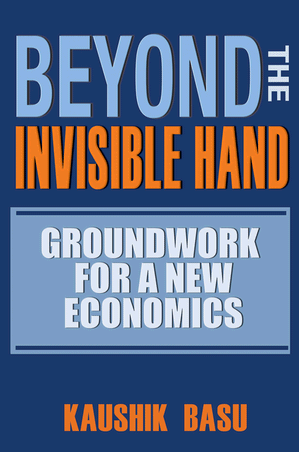Underlying every economic system is a social contract setting people’s norms, values, and beliefs, thereby determining how people are expected to behave within the economy, what their reciprocal obligations are, and how the economy is to be run. Many market economies around the world—in both advanced and emerging countries—rest on a materialistic social contract that is increasingly failing to address basic needs of many citizens.
This materialistic social contract rests on philosopher and economist Adam Smith’s principle of the invisible hand, whereby people pursuing their own self-interest in free markets are led—as if by an invisible hand—to make everyone in society as well off as possible. The popular appeal of capitalist economies relies heavily on this principle, since people usually support capitalism because it is alleged to deliver higher living standards and more economic freedom than alternative economic systems. The underlying assumption is that human needs can be satisfied through material prosperity and that decentralized, self-interested market decisions tend to generate such material prosperity more efficiently than more centralized, coordinated approaches. Political parties differ in terms of the degree of government intervention deemed necessary to redistribute the economic pie, but there is broad agreement that the Invisible Hand is an effective tool to enhance the overall size of the pie.
In many countries, however, this economic model has generated rising inequality in one or more of various dimensions—income, wealth, education, health, skills, and social esteem. The approach has also generated falling social mobility, rising social fragmentation, a widespread sense of disempowerment in response to the vagaries of globalization and automation, and resentment among many people that their hopes for a good life are being ignored. These phenomena are apparent in the political and social divisions within the U.S. and in many countries across Europe, Asia, and Latin America. These divisions undermine the foundation of trust that is essential for well-functioning market economies and the sense of common purpose that is necessary for democracies to work, thereby threatening the future peace and prosperity of nations.
Changing this economic model requires not just technocratic reforms, but a new social contract. Whereas different social contracts are relevant to different societies, all such contracts share certain features aimed at addressing common human needs. The norms, values, and beliefs that are implicit in any particular social contract must be appropriate to satisfy these needs.
Focusing on these commonalities among social contracts has become increasingly important, since the integration of the global economy and the massive increase in the world’s human population have generated problems—from climate change to cybersecurity to financial crises—that are global in scope. Tackling these problems requires the countries of the world to cooperate. For such cooperation to achieve political legitimacy, popular approval of multilateral agreements is required. Such approval, coming from diverse countries and cultures, must draw on the commonalities of the underlying social contracts.
Such commonalities are highly relevant to international policymaking, such as that conducted by the Group of 20 (G-20). Though the G-20 has traditionally focused on economic and financial affairs, its ultimate purpose must be the fulfillment of basic human needs. Today’s nexus of interrelated problems—social fragmentation, personal disempowerment, environmental disruption, and the retreat from multilateralism toward the pursuit of inward-looking national goals—suggests a new social contract is required. That contract in turn provides a foundation for popular approval of the multilateral cooperation required to tackle global problems.
The broad features of a new social contract—specifying a new division of responsibilities between households, firms, and governments—are becoming increasingly clear. They involve moving to a new conception of the relationship between the economy and society, based on the following:
- a reevaluation of the relative importance of material prosperity, social solidarity, and empowerment for wellbeing;
- a broader understanding of inequality.
- a reconsideration of the role of competition versus cooperation in generating economic progress.
This new conception provides insights into how economic prosperity (in terms of GDP and shareholder value) became decoupled from social prosperity (in terms of the wellbeing of individuals in their communities) and how economic and social prosperity may become recoupled.
The Brookings Institution is committed to quality, independence, and impact.
We are supported by a diverse array of funders. In line with our values and policies, each Brookings publication represents the sole views of its author(s).









